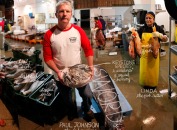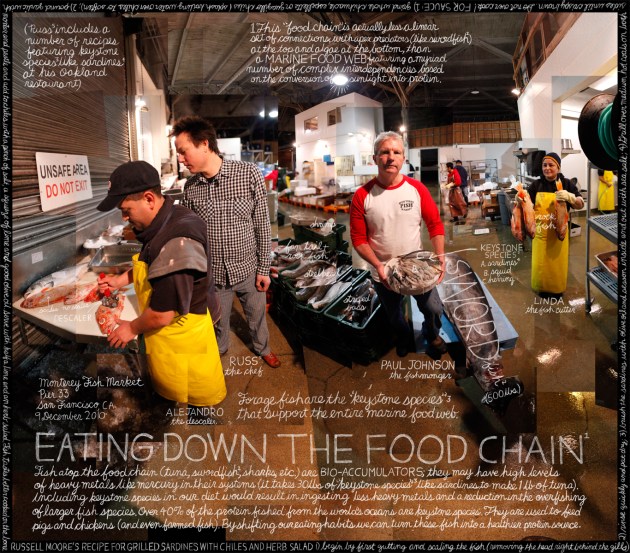Editor’s note: This is your weekly installment of images from the Lexicon of Sustainability. We’ll be running one every Friday this winter, so stay tuned. If you have your own sustainability terms, you can add them to the Lexicon yourself here.
Most of us now know that our oceans suffer from the results of overfishing, and many of the species that remain are under increased pressure from global fisheries. As founder of the Monterey Fish Market and adviser to the Monterey Bay Aquarium’s Seafood Watch Program, Paul Johnson is concerned with the status of Pacific forage fish like herring and sardines. As plankton eaters, these keystone species of the marine food web play a pivotal role in converting sunlight into protein. They also have less accumulated mercury than the “bio accumulators” at the top the food chain like salmon, tuna, and swordfish.
These keystone species comprise over 40 percent of the protein fished from the world’s oceans. They are used to feed pigs, and chickens, other farmed fish. By shifting our eating habits to include keystone species we would ingest less heavy metals and also reduce the overfishing of larger species.
Russell Moore — also featured in the photograph — serves keystone species like sardines at Camino, his Oakland, Calif., restaurant. Here’s his recipe for grilled sardines with chilies and herb salad:
For the fish
- Begin by gutting and scaling the fish (instructions here).
- Rinse quickly and pat dry.
- Brush the sardines with olive oil and season inside and out with sea salt.
- Grill over medium hot coals on both sides until crispy brown. Do not overcook!
For the sauce
- Grind whole chihuacle, espellette, or guagillo chiles (splash boiling water over chiles on occasion to soften).
- Pound garlic with mortar and pestle and add to chiles with a pinch of salt, a squeeze of lime, and good olive oil. Serve with half a lime and an herb salad. Fish tastes better cooked on the bone.




